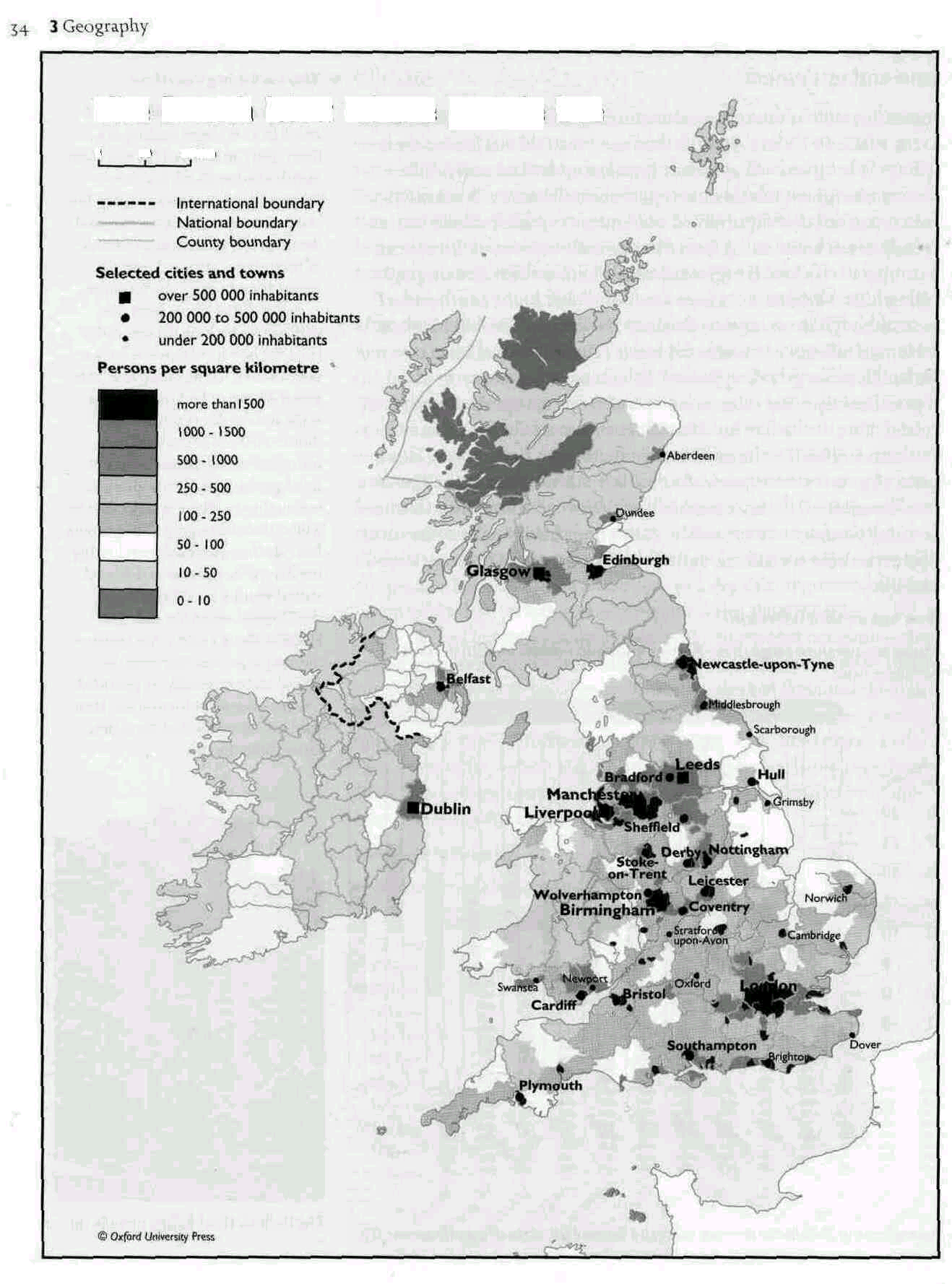
- •20 Food and drink 184
- •21 Sport and competition 191
- •23 Holidays and special 208 occasions
- •Introduction
- •10 I Country and people
- •12 I Country and people
- •14 I Country and People
- •2 History
- •16 2 History
- •18 2 History
- •It was in this period that Parliament began its gradual evolution into the democratic body which it is today. The word 'parliament',
- •20 2 History
- •22 2 History
- •24 2 History
- •26 2 History
- •28 2 History
- •30 2 History
- •32 3 Geography Climate
- •It was in Britain that the word 'smog' was first used (to describe a
- •36 3 Geography
- •38 3 Geography
- •40 3 Geography
- •Part of Snowdonia National Park
- •4 Identity
- •44 4 Identity
- •IrroubleatLllangybi
- •46 4 Identity
- •48 4 Identity
- •50 4 Identity
- •52 4 Identity
- •54. 4 Identity
- •5 Attitudes
- •58 5 Attitudes
- •60 5 Attitudes
- •62 5 Attitudes
- •64 5 Attitudes
- •66 5 Attitudes
- •In the history of British comedy,
- •6 Political life
- •68 6 Political life
- •70 6 Political life
- •72 6 Political life
- •74 6 Political life
- •6 Political life
- •78 7 The monarchy
- •The reality
- •84 8 The government
- •86 8 The government
- •88 8 The government
- •In comparison with the people of
- •9 Parliament
- •92 9 Parliament
- •94 9 Parliament
- •96 9 Parliament
- •100 10 Elections
- •102 10 Elections
- •104 10 Elections
- •I've messed up my life
- •Serb shelling halts un airlift
- •2 January is also a public holiday in
- •Identity 42—55
- •Illustrations by:
30 2 History
QUESTIONS
1 1066 And All That is the title of a well-known joke history book published before the Second World War which satirizes the way that history was taught in British schools at the time. This typically involved memorizing lots of dates. Why, do you think, did the writers choose this title?
2 In 1986, the BBC released a computer-video package of detailed information about every place in Britain. It took a long time to prepare this package but the decision to publish it in 1986 (and not, for example, 1985 or 1987) was deliberate. What is significant about the date?
3 Which of the famous names in popular British history could be described as 'resistance fighters'?
4 Around the year 1500, about 5 million people used the English language - less than the population of Britain at the time. Today, it is estimated that at least 600 million people use English regularly in everyday life - at least ten times the present population of Britain. Why has the use of English expanded so much in the last 500 years?
5 How would you describe the changing relationship between religion and politics in British history? Are the changes that have taken place similar to those that have occurred in your country?
6 Britain is unusual among European countries in that, for more than 300 years now, there has not been a single revolution or civil war. What reasons can you find in this chapter which might help to explain this stability?
SUGGESTIONS
• Understanding Britain by John Randle (Basil Blackwell, Oxford) is a very readable history of Britain, written with the student in mind.
• The Story of English is a BBC series of nine programmes which is available on video. Episodes 2—4 are largely historical in content and very interesting.
• There is a strong tradition of historical novels in English (set at various times in Britain's history). The writings of Georgette Heyer, Norah Lofts, Jean Plaidy, Rosemary Sutcliffe and Henry and Geoffrey Treece are good examples.
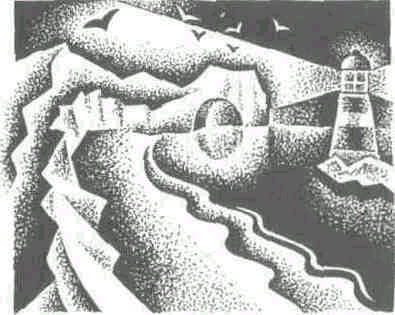
Geography
It has been claimed that the British love of compromise is the result of the country's physical geography. This may or may not be true, but it is certainly true that the land and climate in Britain have a notable lack of extremes. Britain has mountains, but none of them are very high; it also has flat land, but you cannot travel far without encountering hills; it has no really big rivers; it doesn't usually get very cold in the winter or very hot in the summer; it has no active volcanoes, and an earth tremor which does no more than rattle teacups in a few houses is reported in the national news media.
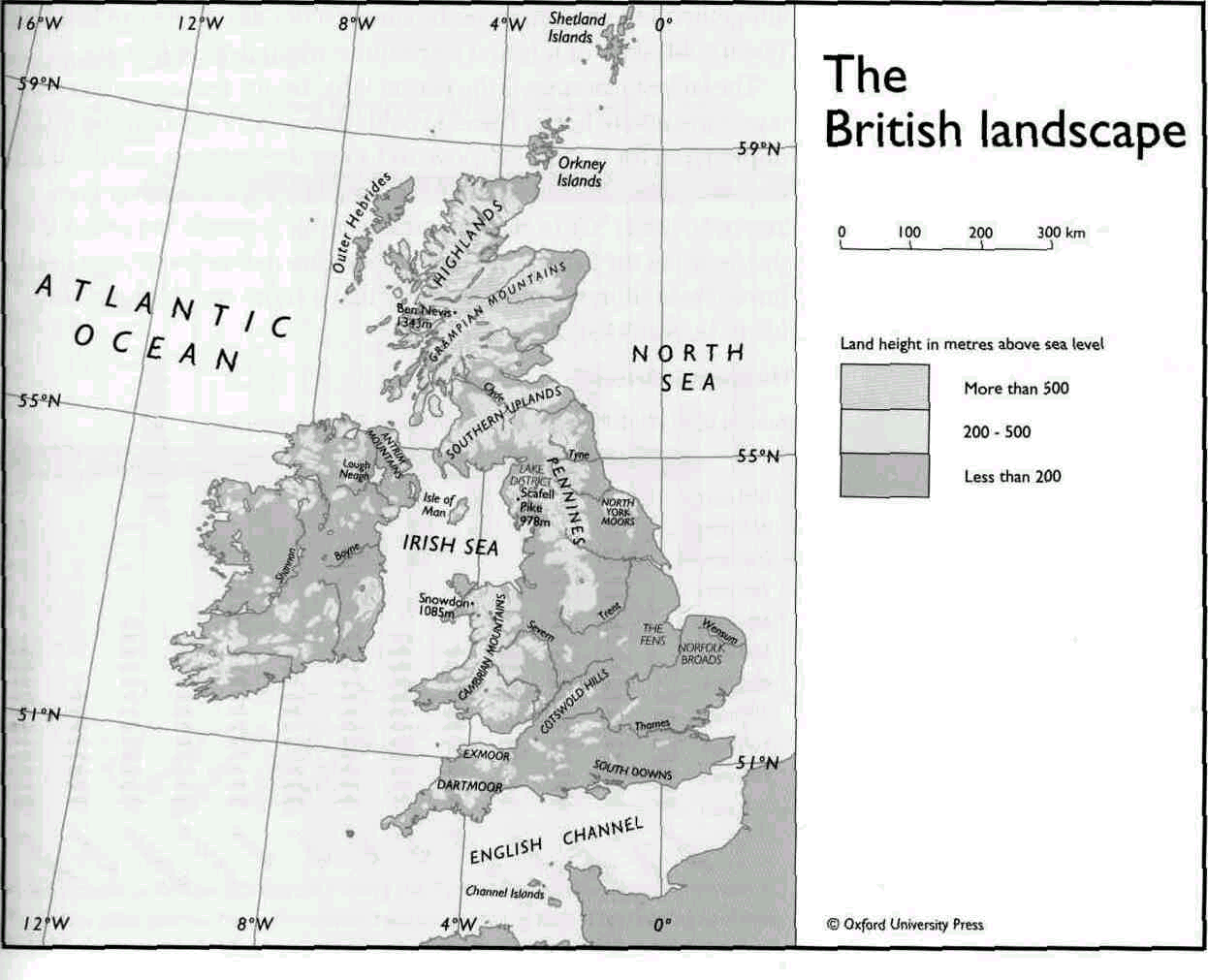
32 3 Geography Climate
The climate of Britain is more or less the same as that of the northwestern part of the European mainland. The popular belief that it rains all the time in Britain is simply not true. The image of a wet, foggy land was created two thousand years ago by the invading Romans and has been perpetuated in modern times by Hollywood. In fact, London gets no more rain in a year than most other major , European cities, and less than some (o How wet is Britain?).
The amount of rain that falls on a town in Britain depends on where it is. Generally speaking, the further west you go, the more rain you get. The mild winters mean that snow is a regular feature of the higher areas only. Occasionally, a whole winter goes by in lower-lying parts without any snow at all. The winters are in general a bit colder in the east of the country than they are in the west, while in summer, the south is slightly warmer and sunnier than the north.
Why has Britain's climate got such a bad reputation? Perhaps it is for the same reason that British people always seem to be talking about the weather. This is its changeability. There is a saying that Britain doesn't have a climate, it only has weather. It may not rain very much altogether, but you can never be sure of a dry day; there can be cool (even cold) days in July and some quite warm days in January.
The lack of extremes is the reason why, on the few occasions when it gets genuinely hot or freezing cold, the country seems to be totally unprepared for it. A bit of snow and a few days of frost and the trains stop working and the roads are blocked; if the thermometer goes above 8o°F (27°C) (> How hot or cold is Britain?), people behave as if they were in the Sahara and the temperature makes front-page headlines. These things happen so rarely that it is not worth organizing life to be ready for them.
> How wet is Britain?
Annual total rainfall (approximate) in some European cities
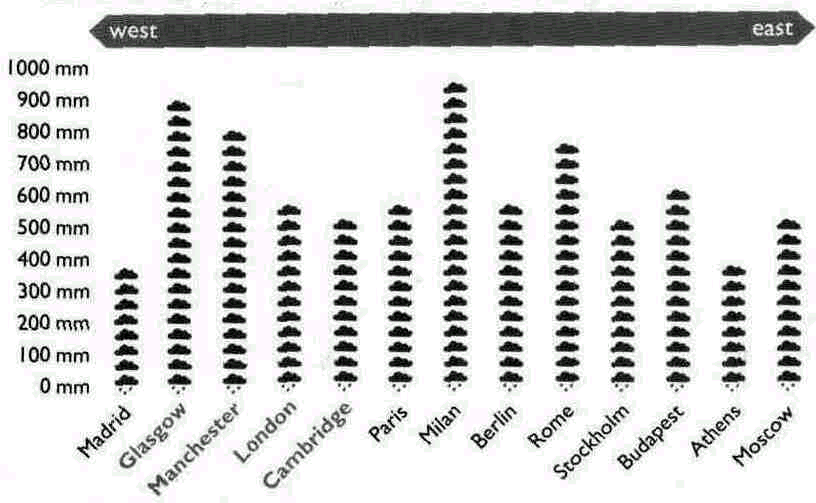
Land and settlement 33
Land
and settlement Britain
has neither towering mountain ranges, nor impressively large
rivers, plains or forests. But this does not mean that its
landscape is boring. What it lacks in grandeur it makes up for in
variety. The scenery changes noticeably over quite short distances.
It has often been remarked that a journey of i oo miles (i 60
kilometres) can, as a result, seem twice as far. Overall, the south
and east of the country is comparatively low-lying, consisting of
either flat plains or gently rolling hills. Mountainous areas are
found only in the north and west, although these regions also have
flat areas (l> The British landscape). Human
influence has been extensive. The forests that once covered the
land have largely disappeared. Britain has a greater proportion of
grassland than any other country in Europe except the Republic of
Ireland. One distinctive human influence, especially common in
southern England, is the enclosure of fields with hedgerows. This
feature increases the impression of variety. Although many
hedgerows have disappeared in the second half of the twentieth
century (farmers have dug them up to increase the size of their
fields and become more efficient), there are still enough of them
to support a great variety of bird-life. How
hot or cold is Britain?
Annual
temperature range (from hottest month to coldest month) in some
European cities
>
The vanishing coastline
Britain is an island under
constant attack
from the surrounding sea. Every year, little bits of the east coast
vanish into the North Sea. Sometimes the land slips away
slowly. But at other times it slips away very suddenly. In
1993 a dramatic example of this process occurred near the town of
Scarborough in Yorkshire.
The Holbeck Hotel, built on a
clifftop overlooking the sea, had been the best hotel in town for i
i o years. But on the morning of 4 June, guests awoke to find
cracks in the walls and the doors stuck. When they looked out of
the window, instead of seeing fifteen metres of hotel garden, they
saw nothing — except the sea. There was no time to collect their
belongings. They had to leave the hotel immediately. During the day
various rooms of the hotel started leaning at odd angles and then
slipped down the cliff. The Holbeck Hotel's role in the tourism
industry was over. However, by 'dying' so dramatically, it provided
one last great sight for tourists. Hundreds of them watched
the action throughout the day.
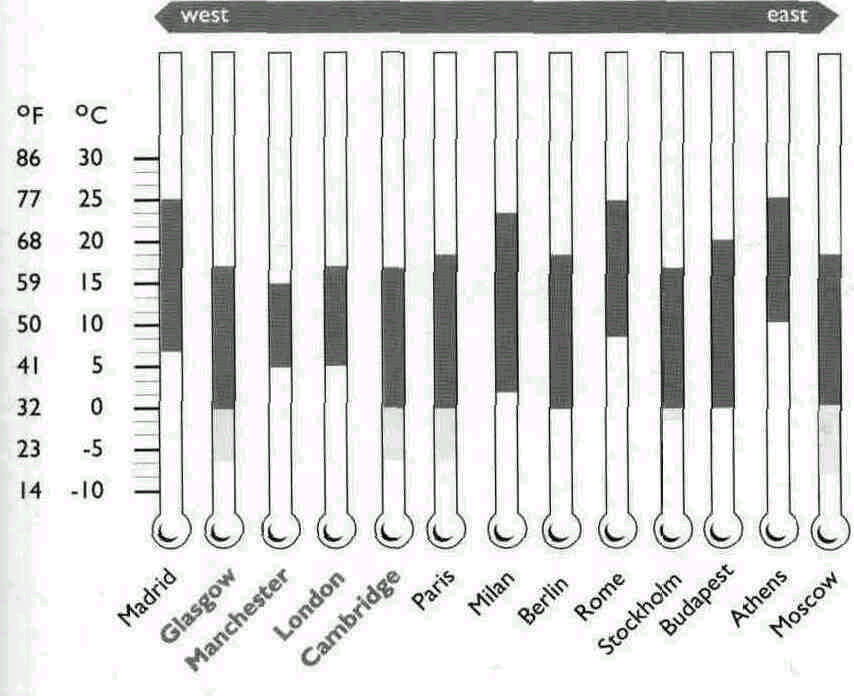
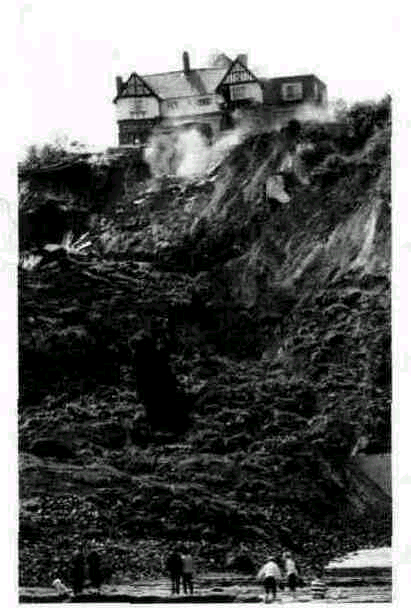
Most
people in Britain are happier using the Fahrenheit scale of
measurement (F). To them, a temperature 'in the upper twenties'
means that it is freezing and one 'in the low seventies' will not
kill you — it is just pleasantly warm.
The
Holbeck Hotel falling into the sea
The
British Isles: where people live
0 50 100km
